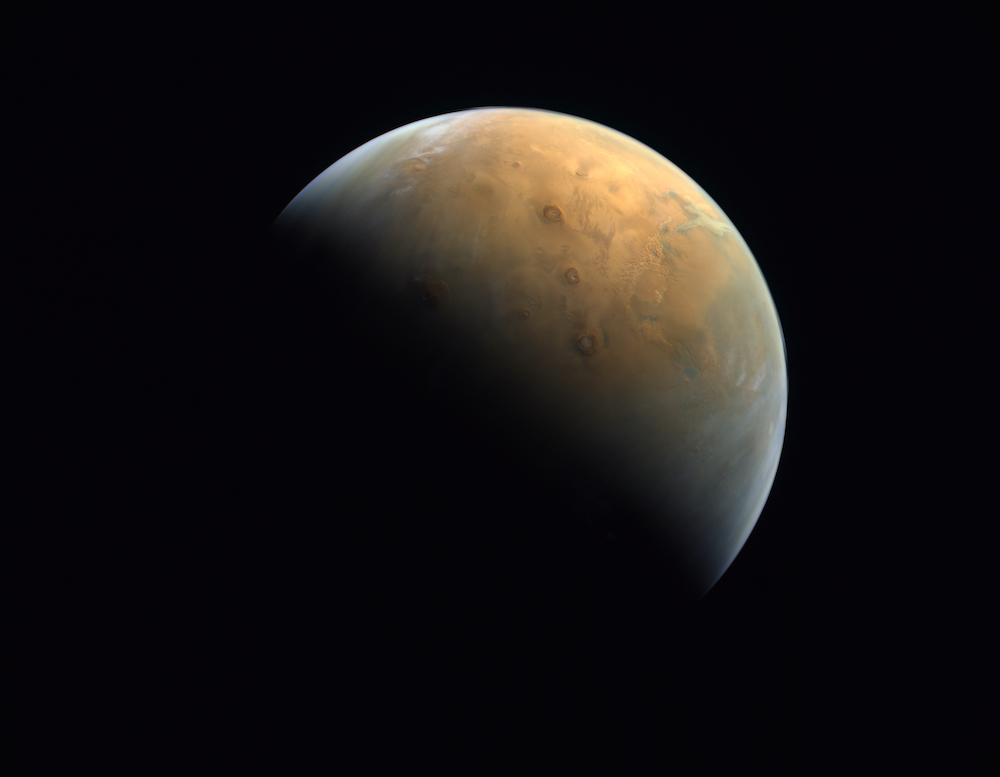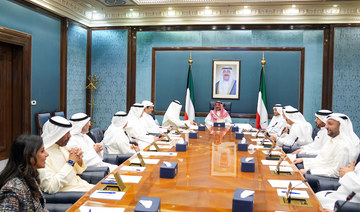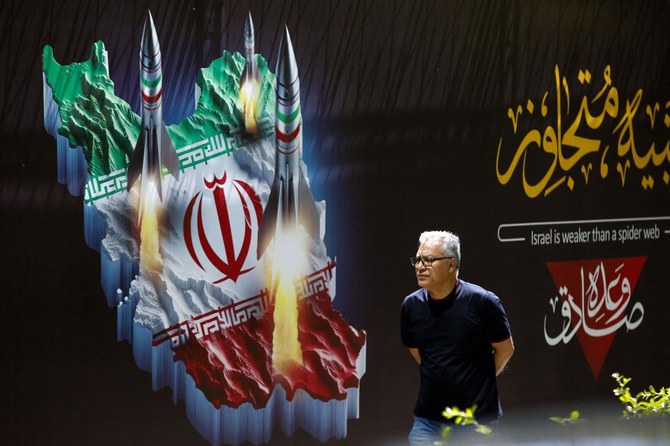DUBAI: After the last of three spacecrafts made contact with Mars this month, the world’s newest space-faring nation is heralding a new age of “space collaboration.”
The United Arab Emirates made history Feb. 9 when it became the fifth country to successfully enter the Martian orbit with its Hope probe, the first interplanetary mission by an Arab nation.
Scenes on the ground in Dubai were jubilant when Omran Sharaf, project manager of the Emirates Mars Mission, announced the orbit insertion was successful. Pictures of the team’s engineers were then projected onto the side of the Burj Khalifa, the world’s tallest tower.
It was an incredible feat considering the UAE Space Agency is less than seven years old and the average age of an Emirates Mars Mission team member is just 27.
It comes at a time of heightened interest in the Red Planet. China’s Tianwen-1 spacecraft celebrated its own successful orbit insertion less than 24 hours later, on Feb. 10. NASA's Perseverance Rover landed on the surface of Mars on Thursday.
A week after the UAE’s successful orbit insertion, Sharaf told Arab News that he is “still sleep-deprived.” His team worked through the weekend to release its first image of the Red Planet five days after the Hope probe started its orbit.

Sharaf's team worked through the weekend to release its first image of the Red Planet five days after the Hope probe started its orbit. (Supplied)
Some of Mars’s most defining features are visible in the picture, including the planet’s north pole and Olympus Mons, the largest volcano in the solar system.
“What you see in this image is what you would see with your naked eye, if you were at a height of 25,000 kilometers above the Martian surface,” Sharaf said.
But the best images of the planet are yet to come, he said, as this particular photo was taken with the probe’s uncalibrated camera.
Sharaf said the team received the image 28 hours after orbit insertion and admitted he felt “relieved” when he saw it.
“Looking at it, as a person, it made me really appreciate the science that is going to be coming out of this mission,” he said. “Having an image helps you know that you actually did it.”
BIOGRAPHY
Omran Sharaf Emirates Mars Mission (Hope Probe) Project Director Mohammed Bin Rashid Space Centre Omran is Project Director of the Emirates Mars Mission (EMM) at the Mohammed bin Rashid Space Centre (MBRSC). He and his team are responsible for developing, launching, and operating the Hope Probe, the spacecraft of the mission.
Omran has worked on the project from its initial conception and developed all the necessary capabilities and partnerships at MBRSC, effectively transitioning the organization from one that focused on earth observation satellites to one that develops interplanetary exploration missions.
An experienced electronics and systems engineer, who trained in the US and Korea, Omran was responsible for developing and implementing the Command Data Handling Subsystem (CDHS) for the DubaiSat-1 high resolution LEO imaging satellite. He also headed the development of the CDH subsystem and payload electronics subsystem for DubaiSat-2, along with being a systems engineer of that project.
Prior to EMM, Omran was Director of the Programs Management Department at MBRSC, which was responsible for defining new strategic programs, the project management office and the product and mission assurance functionalities of the center.
Omran earned his bachelor’s degree in Electrical Engineering from the University of Virginia, USA, in 2005, and his Master's in Science and Technology Policy from the Advanced Institute of Science and Technology (KAIST), South Korea, in 2013.
Sharaf said more pictures will be released soon as the first collection of data collected from the mission will be released to the global scientific community in September.
And this is the sentiment he is most adamant about: The UAE will provide open access to all.
Sharaf said the hallmarks of the mission are “transparency” and “peace,” as well as looking to a post-oil future.
“Maybe superpowers around the world look at it differently than us,” he said. “For us, there are very clear priorities. Our economy is a priority. The reason why we are going into space is to build capacity, capability and a set of skills among the Emirati youth to serve our future.
“And there are also certain national challenges linked to the environment that really require advanced technologies to be developed and customized for the UAE. To do that we need to have people with a certain set of skills and we need to have an industry with very high standards.”
Collaboration is also important. The UAE worked with three US universities on the mission, which launched from the Japanese island of Tanegashima on a rocket made by Mitsubishi Heavy Industries.
“We do not look at it as a space race,” Sharaf said. “We do not even use that terminology within our space community.
“The fundamental element to this was transparency. And this is how you actually ensure that other nations and people understand the main goals behind our mission. Basically, the UAE space program is a civilian program. It is a peaceful one. And this is what we want to emphasize.”
During the mission’s final approach to Mars, Sharaf’s anxious face was beamed around the world on a live stream from mission control at the Mohammed Bin Rashid Space Center in Dubai.
The UAE faced a 50 percent chance of successful orbit insertion and Sharaf did not sleep the night before.
“I do not think I was worried, because I was stressed,” he said. “Did I accept the fact that this might not work? I did at that point. And so whatever the consequences were, for me, it was fine.”
At just after 8 p.m., Sharaf calmly announced the successful insertion to “the people of the United Arab Emirates, to Arab and Muslim nations” and then repeated the phrase “All thanks to Allah” three times.
The Hope team is now calibrating the probe’s instruments and preparing for its transition from a capture orbit into a science orbit in six weeks’ time. The science orbit is elliptical, ranging between 20,000 to 43,000 kilometers, with one complete orbit taking 55 hours. This will allow the probe to complete the first planet-wide picture of Mars’ atmospheric dynamics and weather during both day and night.
During the science orbit, the probe will study how energy moves through the Martian atmosphere.
“This data will lead to new information that will serve humanity and will help us better understand what happened to the Red Planet,” Sharaf said. “It will help us better understand our own climate and the changes that are happening around us.”





















